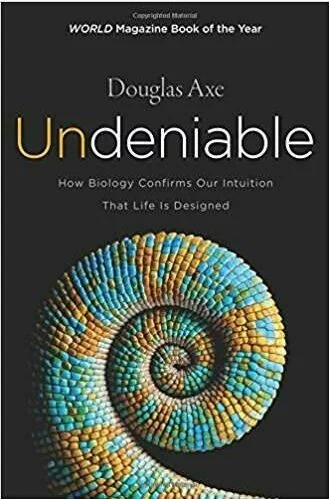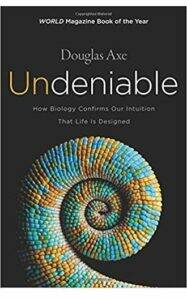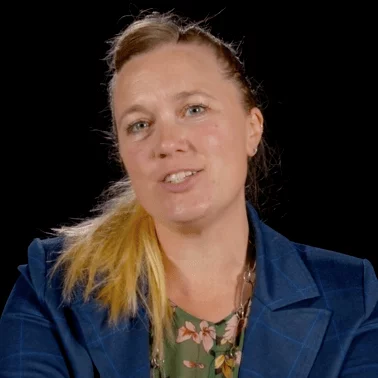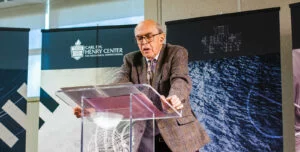I admit that when I received the invitation to review this book, I was unfamiliar with Axe and his work, though I have since learned that he has been on our campus from time to time and engaged with both faculty and students here.
I want to be clear from the outset, however, that I came to this book with a completely open mind and had no expectations one way or another for what I would find here; I believe I was ready to cheerfully engage with my task and with (new?) ideas put forth in these pages. I also clearly recognize that science (my own discipline, but this is evidently true of all pursuits) is done by (human) scientists, and as such, I was further ready and interested to engage in the little personal vignettes that introduced the book and indeed that are peppered throughout. All this being said, I became disappointed and even dismayed extremely quickly by the numerous problems within this volume—some of which relate to the personal vignettes, and some of which relate to the science.
Evolution, Natural Selection, and Randomness
At this point I feel some difficulty evaluating this volume because it is still not clear to me what Axe actually believes about the scientific method, evolutionary mechanisms, and natural selection; I do authentically find it difficult to believe that someone with access to the resources (Cambridge!) and training (CalTech!) that he has had can be so imprecise in his language. At first, I was wondering if conflating ideas (e.g., evolution = Darwinism) was simply a tool to engage novice readers, but since at no point does he break from some of the over-simplifications of the early text, I am inclined to believeFor the teacher-scholar, finding language and a means to make something understandable but not lose the complexity of the issue is the stock of our trade. that he might actually not have bothered to understand how evolution works. Given his “intuition,” perhaps it was simply not worth the mental effort to understand the mechanisms and data that have built up over the past hundreds of years, at least since Buffon’s early attempts.
Furthermore, I find it strange that a biochemist actually believes that we went from single elements to 30,000 amino acid proteins like titin with no intermediary steps (as he suggests with the alphabet soup metaphor). No other specialist would consider this a viable option. The human body alone is full of thousands of examples of mixing-and-matching functions, of joining together multiple proteins to do something new, of borrowing and scaffolding and re-purposing molecules. There is thus clear evidence of how small changes can bring about functional novelty in biological systems, as well as the flexibility of shape-shape relationships found between proteins. Any basic physiology textbook, Simon Conway Morris’ tome The Runes of Evolution, and Ben McFarland’s excellent A World From Dust are all places where a more elegant and authentic evaluation of the origins of biological diversity, even at the levels of protein folding, can be found. Unsurprisingly, these volumes are all written to engage students in learning, understanding, and evaluating the myriad of data about life on earth. For the teacher-scholar, finding language and a means to make something understandable but not lose the complexity of the issue is the stock of our trade. To this end, I can readily explain to my students the array of evidences that exist for all of the mechanisms of evolution that can perturb a system away from Hardy-Weinberg equilibrium. I can explain in a few sentences that whereas natural selection is never random, and is our best explanation for adaptations, there are other evolutionary mechanisms that can work randomly and we have examples for random change in parts of our face and in the length of stalk-eyed flies eye stalks.
Moving Paradigms and the Scientific Method
As I stated in the beginning, I do know about science being done by scientists and furthermore about a guild working within a functional paradigm and taking time to reshape the paradigm. I have worked over my career to move two paradigms that have existed since the 1950s—one relating to how we understand the energetic cost of human running, and one relating to how we understand the intersection between human locomotion, reproduction, and anatomy (namely, the obstetrical dilemma). I understand about people questioning my intentions at meetings and hesitating to publish my work; I sympathize with Axe’s tales of woe, because I also have experienced other scientists not citing my work and have missed out on invitations to contribute to some prestigious symposia. But I am grateful and confident that science is self-correcting; I have confidence because every project I have ever done has shown the same outcome, and over the past fifteen years I have managed to get people to at least start asking questions in new ways—as well as to cite my work and get those special invitations.
The challenges of questioning and moving paradigms do not just occur within science. During this celebration of the 500th anniversary of the Reformation, I am reminded that Luther died knowing that there was not universal acceptance of his ideas, though a movement of new questions and renewed purpose clearly emerged, even among those who disagreed with him. No single person pulls an entire discipline with a single publication or all alone. What we hope for as scientists is that our work gets people to ask new questions—better questions if I can go so far as to make a moral suggestion. If we want to apply this logic to Darwin’s 1859 publication, we can be quite assured that it is not until the twentieth-century that enough other people had bothered asking questions about resources, diversity, inheritance, fossils, mutations, and population genetics that scientists were able to settle with something supporting the mechanism of natural selection. Because of the work of many, we have been able to uncover the intricaciesThe variety of evolutionary mechanisms that God used for creating were interesting and exciting for God, and God chose these mechanisms on purpose because creation is better for them. of other mechanisms, such as with Tomoko Ohta’s work on drift in small populations. This process of “working through the possibilities” is currently happening with our understanding of the genome and genetics, and the present over-reliance on one type of data will be corrected by hundreds of different scientists asking good questions. Perhaps Axe should turn instead towards encouraging others to replicate his experiments, or to develop some new experiments of their own. If such a movement could stimulate innovative ideas and other approaches to how protein evolution works, it is possible that protein evolution could help us understand how the world works and why God chose to create anything at all.
In conclusion, I would like to offer my own intuitions about life on earth. My intuition is that God loves creation and believes it to be good. My intuition is that God is as much a part of nature as of the supernatural; this means that the Book of Nature is as remarkable and amazing as the Book of Scripture. Because of these intuitions, I further understand and intuit that the variety of evolutionary mechanisms that God used for creating were interesting and exciting for God, and God chose these mechanisms on purpose because creation is better for them.








Comments
Be the first one to make a comment!